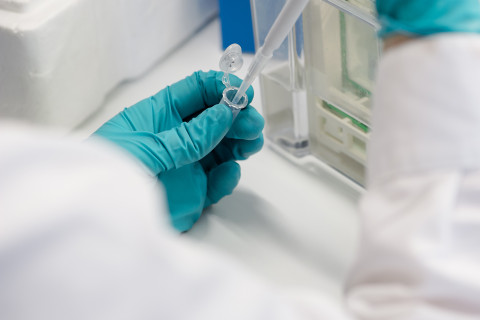The doctoral thesis of Prosanta Singha, MSc, focuses on approaches to find affordable and effective ways to study and target different enzymes that have clear role in human disease, for example, cancer. The thesis was aimed on methods development to study protumorigenic enzymes, particularly Autotaxin (ATX), and fatty acid synthase (FASN).
Cancer is the disease of uncontrolled cell division; cancer cells behave differently from normal cells in the body. During the process of cancer formation, cells must go through several steps where certain enzymatic pathways play a crucial role. Normal body cells grow, divide, and stop growing as required, but cancer cells grow continuously regardless of their need for the body and achieve immortality. Eventually, they form cell masses known as tumours, which may migrate and invade nearby tissues, or travel to distant places via blood vessels or lymphatic system to form new tumours in other organs of the body. ATX produces the lipid signaling molecule lysophosphatidic acid (LPA) in the tumour microenvironment that stimulates the migration of cancer cells, while FASN ensures a continuous supply of the long chain fatty acid palmitate, the key building block of the cell membrane for rapidly growing tumour cells.
Egg white is a cheap source of ATX to screen inhibitors
In Singha’s thesis, hen egg white was used and validated as an affordable source of ATX (ewATX). Singha optimized a method to screen different chemical compounds in an effort to discover novel ATX inhibitors. The hit compounds from ewATX inhibitor assay were further validated using recombinant human ATX to validate the method he optimized. With the egg white assay, he tested several compounds and was able to discover a chemical compound that inhibited ATX at nanomolar concentration. Furthermore, the compound showed effectiveness against melanoma cancer cell migration in vitro.
Existing FASN inhibitors differentially target human and rodent FASN
Mr. Singha has also shown potency differences of various FASN inhibitors that have been developed and studied previously. He developed and optimized a FASN activity assay and showed that certain chemical compounds that have been claimed as most potent FASN inhibitors in certain types of cancer cell lines but were not equally effective against FASN in other cancer cell types. He used both human and rodent cancer cell lines to compare inhibitor functionality in vitro and in situ.
Tissue-ABPP, a new approach to reveal origin of cell typed with heightened serine hydrolase activity in the tumour microenvironment
Traditionally, activity-based protein profiling (ABPP) has been used to identify serine hydrolase activity present in tumour homogenates using gel-based approaches. Mr. Singha advanced the existing mobility-based ABPP method to rat brain tumour (glioma) cryosections without disturbing the cytoarchitecture to enable visualization and localization of heightened serine hydrolase activity in the tumour microenvironment. He also applied extensive antibody-based immunohistochemical methods coupled with mass spectrometry to identify the cell types possessing high serine hydrolase activity in tumour microenvironment to facilitate drug discovery in efforts to target such cells.
The doctoral dissertation of Prosanta Singha, Master of Science, entitled Development of methods and inhibitors to target key enzymatic nodes generating protumorigenic lipid signaling, will be examined at the Faculty of Health Sciences. The Opponent in the public examination will be Associate Professor Timo Myöhänen of the University of Turku, and the Custos will be Docent Jarmo Laitinen of the University of Eastern Finland. The public examination will be held in English. The public examination will be streamed online on 18 December 2020 starting at 12 noon.



